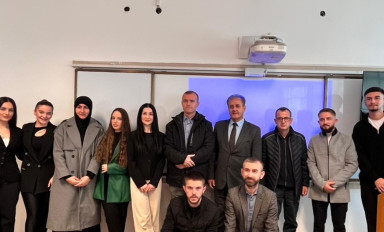Literary Studies
The one-year Master’s program in Literary Studies, offered by the Department of English Language and Literature, is designed for those with a passion for literature and a drive to engage critically and creatively with texts, cultures, and ideas. Offering a unique opportunity to explore individual research interests, this program allows students to tailor their academic journey according to their intellectual curiosities and professional aspirations. With a curriculum that combines theoretical depth, historical breadth, and interdisciplinary flexibility, students are empowered to chart their own academic paths, supported by expert faculty and enriched by a vibrant scholarly community.
The program is structured around seven core courses to prepare for the Master’s thesis, all completed over two semesters. These core courses introduce the main research orientations within the field of literary studies: literary theory and criticism, and cultural history. Alongside the core courses, students will select one elective and participate in a tutorial each semester. These elements allow students to deepen their knowledge and refine methodological skills in areas that interest them. In the final semester, students will complete the MA thesis, conducting an in-depth investigation into a specific problem in literary studies and situating their proposed solution within current theoretical frameworks.
The intended learning outcomes of the MA program in Literary Studies are meticulously aligned with the overall goals and objectives of the study program, ensuring a cohesive and purpose-driven educational experience. Each learning outcome has been crafted to directly support the program’s overarching objectives, including the development of advanced critical thinking skills, a deep understanding of literary theories, and proficiency in research methodologies relevant to literary studies. This alignment guarantees that the skills, knowledge, and competencies students acquire through the program fully reflect and support its foundational goals. Consequently, this connection between goals and learning outcomes reinforces the program's integrity, coherence, and relevance, ultimately preparing graduates for meaningful contributions in education, research, and beyond.
By the end of the program, students will achieve the following learning outcomes:
Research and Knowledge: Students will acquire advanced research skills necessary for conducting independent scholarly investigations in literary studies. They will be proficient in locating, evaluating, and synthesizing primary and secondary sources, and in formulating original research questions.
Critical Thinking and Interpretation: Graduates will develop a nuanced understanding of literary texts, demonstrating the ability to interpret them within broader cultural and theoretical frameworks. They will critically engage with diverse literary traditions, examining issues of representation, identity, ethics, ideology, power dynamics, and aesthetic forms.
Professional Communication: Students will enhance their ability to communicate effectively about literary texts and ideas, both orally and in writing. They will be capable of producing clear, well-structured academic essays, presentations, and critical analyses suitable for academic and professional audiences.
Cultural and Global Awareness: The program will foster students' awareness of global literary traditions and the interconnectedness of literature across cultures and languages. Graduates will appreciate the diversity of literary expressions and understand the role of literature in shaping cultural identities and societal values.
Ethical and Reflective Practice: Graduates will engage in ethical reflection on literary scholarship and practice. They will demonstrate awareness of ethical issues in literary research and writing, including questions of representation, intellectual property, and cultural sensitivity.
Preparation for Further Study and Careers: The program will prepare students for further academic study at the doctoral level if desired, or for careers in fields such as education, publishing, cultural institutions, journalism, and arts administration.
STUDY GUIDE MA Programme in Literary Studies (2025 - 2028)
Program Bearers :

 Library
Library .jpg)


.png)
